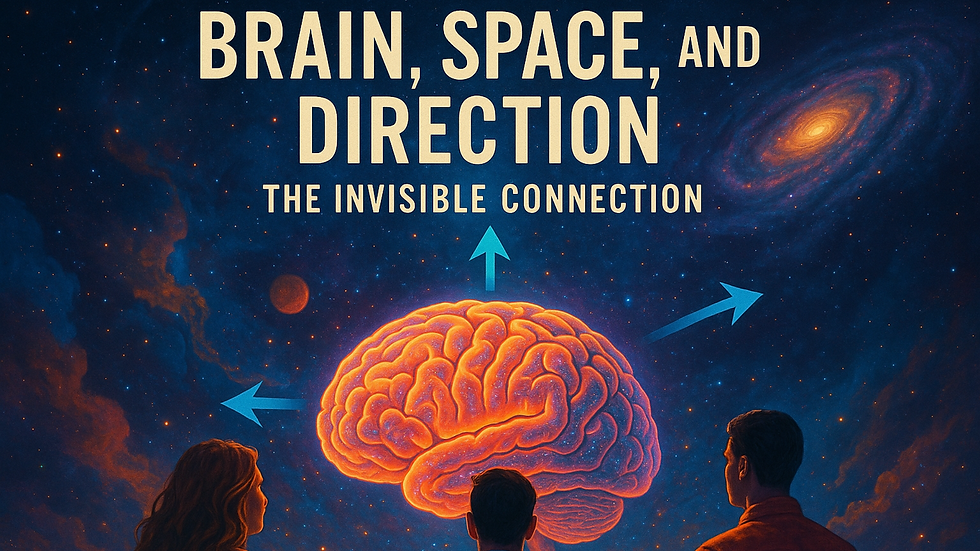The Best Direction to Study: What Cognitive Science and Productivity Research Reveal
- ronald6876895
- Jun 25, 2025
- 3 min read

If you find yourself studying for hours but still battling distractions, a lack of focus, or mental fatigue, the issue may not lie solely with your self-discipline. Instead, it might be rooted in how you approach your study environment and direction.
Many people equate productivity primarily with time management and personal willpower. However, a growing body of research in cognitive science and environmental psychology highlights that your physical orientation—meaning the direction you face while studying—and your surrounding environment are crucial factors in how effectively your brain processes information.
So, what is the best direction to study in, and why is this important?
Let’s delve deeper into the connection between the brain, space, and directional dynamics.
Brain, Space, and Direction: The Invisible Connection

Studies in environmental psychology indicate that the direction in which you face while studying can significantly influence several critical elements:
Light Exposure:
This directly affects your circadian rhythms, telling your body when to feel alert or when to wind down.
Visual Fatigue:
The layout of your study space can impact your eye strain and comfort.
Alertness and Mental Energy:
Facing certain directions can either bolster or hinder your mental vigor.
Emotional States:
Your posture and direction can influence feelings of motivation or anxiety.
The brain is highly responsive to spatial and environmental cues. For instance, orienting your study desk thoughtfully can dramatically elevate cognitive performance, making your learning more effective.
Natural Light and Orientation
When selecting your study direction, one of the most pivotal factors is natural light exposure. Positioning yourself to face a window that allows daylight—especially from the east or north—has been shown to enhance alertness and elevate mood by helping to synchronize your internal biological clock.
Scientific Insight

Research indicates that morning sunlight, rich in blue wavelengths, plays a vital role in stimulating serotonin production while suppressing melatonin levels. This biochemical shift helps maintain wakefulness and focus throughout your study sessions.
Tip:
If you're studying in the morning, try positioning your desk to face east or northeast. This alignment could harmonize with your natural circadian rhythms and enhance your alertness. You can also join live astrology sessions to learn more about directions and vaastu.
Avoid Facing Walls or Clutter
Positioning yourself to face a wall can create a subconscious feeling of confinement and limit your peripheral vision. This sense of being "boxed in" may inadvertently stifle creative thought and increase feelings of restlessness.
Tip:
If possible, orient your workspace towards a more open area or arrange your desk so it’s near a window while minimizing visual clutter. An uncluttered view provides your brain with much-needed "breathing space," fostering a more open and relaxed mental state.
Digital Study Spaces: What About Screens?

In our digital age, most of us are anchored to our screens. Therefore, the orientation concerning background lighting becomes crucial. Avoid setups where backlighting creates a glare on your screen or where overly bright lighting in front causes unnecessary eye strain. With any astrologer appointment booking app, you can find your solution to this dilemma easily.
Tip:
Position your screen perpendicular to windows. If natural light is behind you, consider using sheer curtains to soften the brightness, creating a more comfortable viewing experience.
The Role of Noise and Distraction Zones
Your choice of direction also plays a significant role in managing distractions. For instance, positioning your desk away from household activity zones—like the kitchen or living room—can minimize interruptions and maintain your focus.
Additionally, having your back to a wall provides a psychological benefit known as the “command position,” which can instill a sense of security.
Tip:
Whenever possible, face away from doors or high-traffic areas. This might help to diminish subconscious stress and prevent sudden startle responses caused by unexpected movements behind you.
You can also watch: AstroLive | Astrology Tips for Academic Excellence
Final Thought: Direction as an Optimization Tool
Ultimately, the best direction to study is the one that enhances your brain's capability to focus, absorb information, and remain energized. This optimal setup may vary depending on the time of day, your personal study habits, and the design of your space.
This understanding is not merely a reflection of ancient beliefs or spiritual traditions; contemporary research underscores that where you sit—and more specifically, which direction you face—can profoundly impact your mental clarity and overall productivity.
_edited.jpg)


Comments